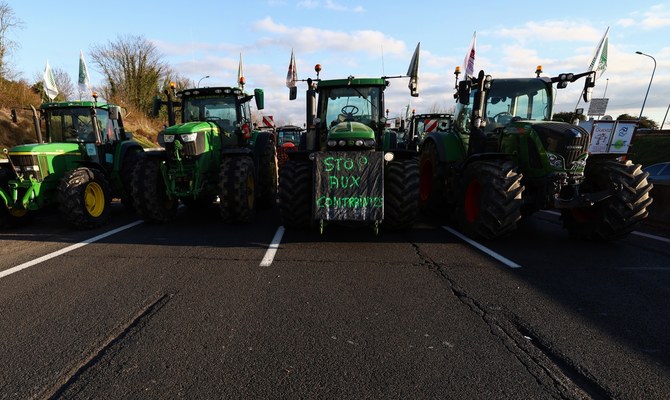
I stand with the farmers of France and the rest of Europe. I stand with these men and women who dedicate their lives, day in and day out, to working the land. I support them during a period when policymakers, detached from reality, are jeopardizing the livelihoods of an entire profession and endangering the rest of the world with the risk of food penury. I stand with them as they uphold tradition and the values of hard work, while fighting for their future and ours.
This situation was expected. Just as weak politicians have been bullied by mobs on energy, cornering Europe when the Ukraine war started, they are now doing the same with agriculture and food supplies, putting not only farmers but the entire population in danger. This is something I warned about in a previous column in October 2022, which was titled “Sustainability needs sensible approach to benefit planet, not just few.”
Farmers’ anger is growing across Europe, from the Netherlands to Romania and through Germany, Italy and France. Their motivations may differ, but they are mainly expressing their discontent, through protests and blockades, against the EU’s agricultural policies.
The focal points might be different, such as protests over fuel prices, Ukrainian competition or new environmental measures. But although the factors may seem different and local, the root cause is one that affects all farmers across the EU: Brussels’ flawed policies toward globalization and climate change. This unrest emphasizes the vital role of agriculture in providing food and securing the future.
Farmers’ anger is growing across Europe, from the Netherlands to Romania and through Germany, Italy and France
Khaled Abou Zahr
Farmers in France are angry due to their government’s perceived lack of consideration, rising production costs and increased European regulations. The stakes are high as, according to official census data, between 2010 and 2020, France lost 20 percent of its farms. Their protests, which began with highway blockades and an explosion at an environmental office, highlight issues like the impacts of climate change, delayed agricultural legislation and the decline in farm numbers.
Moreover, farmers cite challenges for young entrants to the industry and noncompliance with the so-called EGalim law, which aims to strengthen the balance in commercial relationships between suppliers and distributors, and environmental norms. The recent tax increase on non-road diesel — which was scrapped last week — added to their grievances. Farmers also criticize the EU’s Common Agricultural Policy, pointing to delayed payments. The government’s response, including Prime Minister Gabriel Attal meeting farmers, aims to ease tensions, but the farmers have threatened to escalate their protests, potentially impacting the Paris International Agricultural Show, a highly symbolic annual event that is due to take place on Feb. 24.
In Germany, farmers are demanding the reinstatement of tax relief for diesel used in agricultural vehicles and the removal of vehicle tax on tractors. They are also calling for a reevaluation of the “Farm to Fork” strategy, urging the EU to stop penalizing farmers. As European Parliament elections approach, these agricultural concerns may significantly influence the political landscape.
As reminded by a historical article in French newspaper Le Figaro this week, farmers’ discontent has deep roots and a legacy of protests. The core of their dissatisfaction lies in issues such as inadequate remuneration, complex environmental regulations and a history of grievances related to competition from imports and fraudulent practices.
Historical protests, notably the 1907 Languedoc winegrower revolt, set a precedent. Their stand against foreign wine imports and fraud set the stage for organized agricultural movements.
As European Parliament elections approach, these agricultural concerns may significantly influence the political landscape
Khaled Abou Zahr
Over the years, farmers have engaged in various protests, including the setting up of barricades, sabotage and destroying goods, reflecting their dissatisfaction with agricultural policies and economic challenges.
In more recent history, the 1976 tragedy in Montredon-des-Corbieres marked a turning point, as clashes with law enforcement resulted in fatalities, highlighting the severity of farmers’ grievances. Despite attempts to avoid violence, subsequent actions — such as Jose Bove’s 1999 dismantling of an under-construction McDonald’s outlet — showcased farmers’ ongoing struggle for visibility and recognition.
These events underscore the enduring nature of farmers’ dissatisfaction and the evolution of their grievances over time.
France is not the only country with such a history, with the number of protests around Europe growing in the last decade. Indeed, we should remember the 2022 Dutch farmers’ protests and road blockades. In an interview at the time, journalist Roger Stryland explained that the main concern was nitrogen pollution affecting natural areas. The government, led by Mark Rutte, proposed radical measures, suggesting that 60 percent of farms either transition or cease operations to combat this phenomenon.
But the Netherlands has a high concentration of livestock, with 11 million pigs, 4 million cows and 100 million chickens for a population of 18 million people. Therefore, this decision understandably provoked frustration, putting about 30,000 farms in jeopardy. With the Netherlands being the world’s second-largest agricultural exporter, the move also caused concerns about its impact on food supplies.
The main issue is that all proposed transitions to less-polluting technologies require significant investments, which cannot be undertaken by the farmers alone. This highlights the risk of imposing environmental regulations without a logical and smart transition. It also shows the disconnect between EU regulators’ noble environmental goals and the bare necessity of feeding the population.
The EU has achieved great things and enhanced the lives of people throughout the continent, but it needs to reassess these policies in order to protect and safeguard its future. Without farmers, there is no life.
Khaled Abou Zahr is the founder of SpaceQuest Ventures, a space-focused investment platform. He is chief executive of EurabiaMedia and editor of Al-Watan Al-Arabi.











